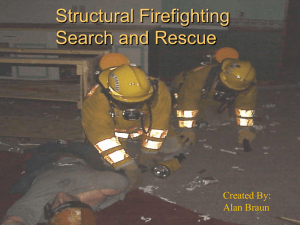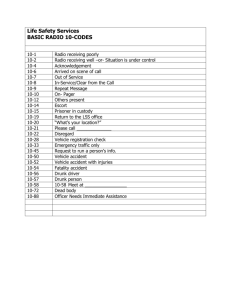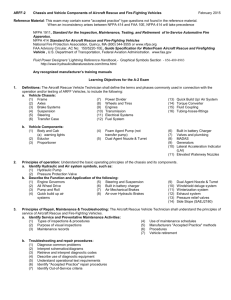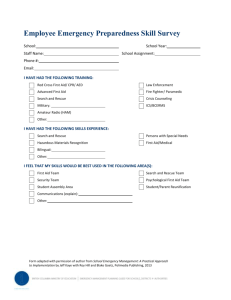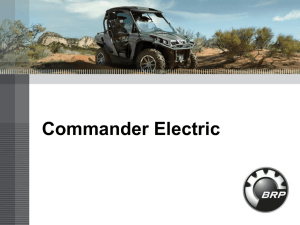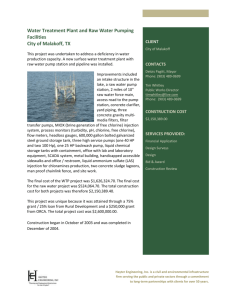File - South River Machar Fire Department
advertisement
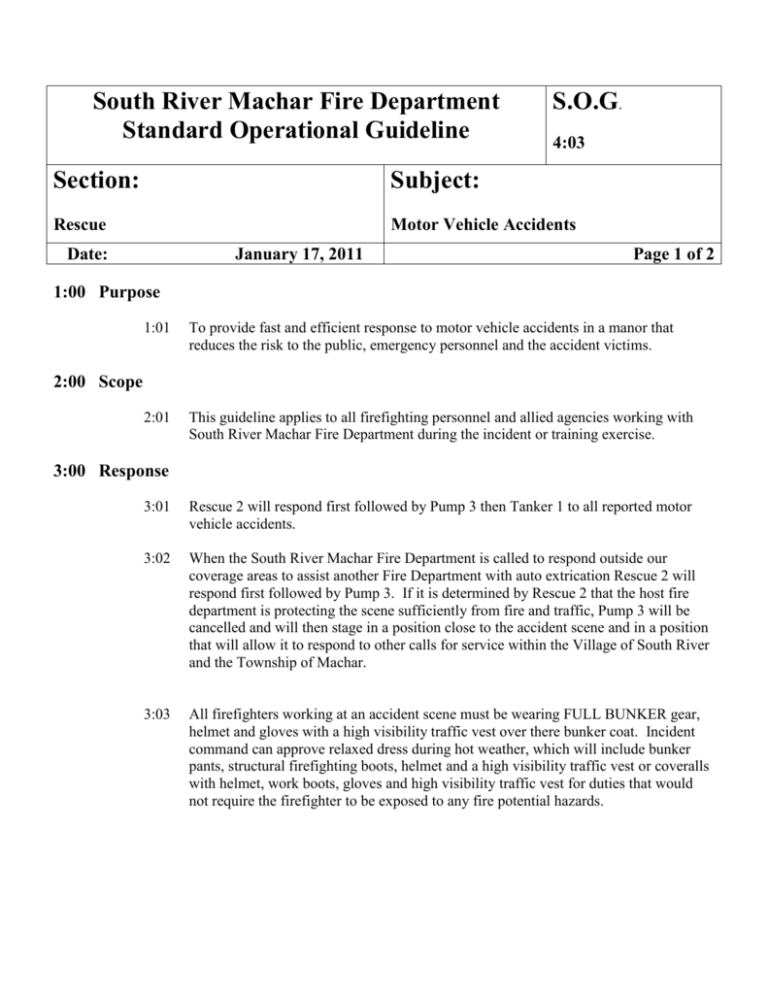
South River Machar Fire Department Standard Operational Guideline S.O.G. 4:03 Section: Subject: Rescue Motor Vehicle Accidents Date: January 17, 2011 Page 1 of 2 1:00 Purpose 1:01 To provide fast and efficient response to motor vehicle accidents in a manor that reduces the risk to the public, emergency personnel and the accident victims. 2:01 This guideline applies to all firefighting personnel and allied agencies working with South River Machar Fire Department during the incident or training exercise. 2:00 Scope 3:00 Response 3:01 Rescue 2 will respond first followed by Pump 3 then Tanker 1 to all reported motor vehicle accidents. 3:02 When the South River Machar Fire Department is called to respond outside our coverage areas to assist another Fire Department with auto extrication Rescue 2 will respond first followed by Pump 3. If it is determined by Rescue 2 that the host fire department is protecting the scene sufficiently from fire and traffic, Pump 3 will be cancelled and will then stage in a position close to the accident scene and in a position that will allow it to respond to other calls for service within the Village of South River and the Township of Machar. 3:03 All firefighters working at an accident scene must be wearing FULL BUNKER gear, helmet and gloves with a high visibility traffic vest over there bunker coat. Incident command can approve relaxed dress during hot weather, which will include bunker pants, structural firefighting boots, helmet and a high visibility traffic vest or coveralls with helmet, work boots, gloves and high visibility traffic vest for duties that would not require the firefighter to be exposed to any fire potential hazards. 4:00 Procedure 4:01 Rescue 2 will respond with a minimum of 4 firefighters and park in accordance with SOG 1:001 driving to emergencies and in a manor that will allow for rapid deployment of hydraulic tools located on the drivers side of the vehicle. 4:02 Pump 3 will respond with 2 firefighters and will provide fire suppression utilizing 1 45mm hose line. Pump 3 shall be parked in accordance with SOG 1:001. The passenger of pump 3 will staff the 45mm hose line wearing full bunker gear and SCBA, not on air unless required to perform fire suppression. The driver of pump 3 will be the pump operator. 4:03 Tanker 1 shall be parked in accordance with SOG 1:001. Tanker 1 crew will assume traffic control as directed by the incident commander. 4:04 If fire suppression is required Pump 4 will respond as well as Unit 5, Pump 4 crew will assist with fire suppression efforts while Unit 5 will assume traffic control duties. 5:00 Rescue 5:01 The first arriving fire officer or senior firefighter will assume initial command and will perform initial size up including an inner and outer size up of the incident. The Incident commander can delegate the inner and outer perimeter check when there is sufficient staffing available. 5:02 All personnel will stage at rescue 2 until given direction from the Incident Commander. Once assigned tasks are completed all personnel will return to the staging area for next assignment. 5:03 All vehicles involved in the accident must have the ignition key turned to the off position. 5:04 All vehicles requiring patient extrication or patient care while the patient is in the vehicle should be stabilized with blocking prior to any rescue efforts. Vehicles should be stabilized prior to any firefighter or allied agency personnel entering any vehicle involved in the accident. 5:05 When multiple vehicles are involved requiring multiple rescues, crews should be divided up and assigned to a vehicle with a crew commander assigned to each vehicle. Crews should be identified by the vehicle they are assigned for example pick up team or blue team. 6:00 Responsibility 6:01 It is the responsibility of all Firefighter’s involved in the emergency or training exercise to ensure this guideline is followed in its entirety. 6:02 It is the responsibility of the Commander’s to ensure the guideline is adhered to in its entirety. 6:03 It is the responsibility of the incident commander to ensure that all equipment used during the call is replaced, cleaned, refuelled as required to be ready for the next call. Equipment that is damaged or lost will be documented on the call sheet and white board. Fire Chiefs Signature Date July 25, 2013
